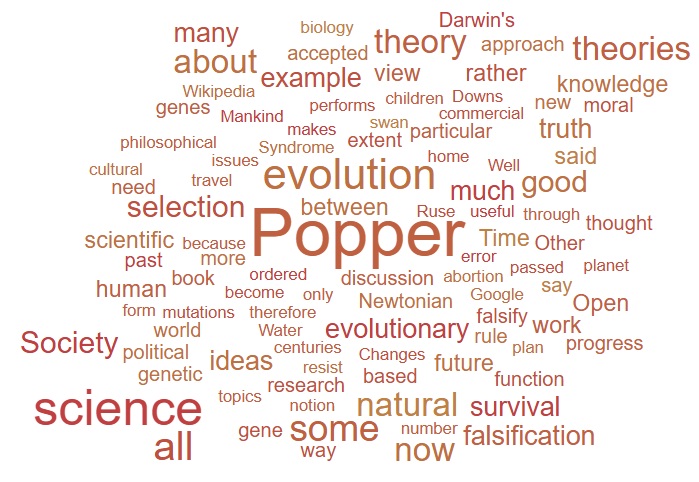Popper, Darwin and Natural Selection
|
The Wells School of Philosophy
Roll Call 20th August 2024, Hare Lane, 1000-1200 hrs: Tutors: Linda (L), Steve (S) Pupils: John (J), Patricia (P), Alexis (A), David (D), Margie (M), Viki (V), Howard (H), Ray (R), Scribe: Gavin (G) Apologies: Colin (C) The homework setWe decided for the first meeting of the session to look at the philosophical response to Darwin’s theory of evolution. The theory also had a seismic effect of course on theological thought, which was arguably more tightly bound to philosophy in the 19th century. Karl Popper, a founder of the philosophy of science, took the work of Darwin as a springboard for his thinking. He maintains that a theory in the empirical sciences can never be proved, but it can be falsified, and should be subject to continued scrutiny by experimentation. In Popper's view, the advance of scientific knowledge is an evolutionary process of error elimination. This process performs a similar function for science that natural selection performs for biological evolution. Other philosophers concur with Popper that Darwin’s work leads to a profound re-think of philosophical as well as theological ideas… what is truth, is it possible to establish truth… etc? As a starter the Wikipedia entry on Popper is useful, as is the In Our Time on Popper; just Google 'In Our Time Popper'. We will shortly circulate more to chew on, including some key questions. The links between scientific theories of evolution, starting with Darwin's, and philosophy promises to be a particularly rich area of discussion. It encompasses how evolutionary biology influences our view of the world; how we understand it, what is revealed by science. And what is not. What might be considered 'progress'? How reliable is the science, to what extent can we regard it as a source of truth about how the world, and in particular Homo sapiens has evolved and what the future might hold? Yet again coming back to the old chestnut of what is the nature of the human condition? What makes us different? If you have listened to the IoT on Popper you will probably have been struck by how radical are his ideas about science and many other topics, including science and his views on politics based on the need for an 'open society'. But despite basing his approach on 'falsification', he is no defensive sceptic; on the contrary, his philosophy is bold and creative, designed to take knowledge somewhere new, not rooted in past, earlier observations. Just as spontaneously arising successful genetic (and maybe now 'epigenetic') modifications function in natural selection. This area of the relationship between evolutionary biology and philosophy has been the focus of the lifetime work of the living British philosopher Michael Ruse. In 2012 he published a book entitled 'The Philosophy of Human Evolution'. We've ordered a copy. There are a number of useful LRB-type wide-ranging reviews of the book if you Google the book title. There is also a Wikipedia entry. These sources raise lots of interesting questions, which we can use as the basis of our discussion next Tuesday. In no particular order:
Introduction A(S)Does everything that happens conform to a long-term plan? The world today is very unpredictable. Evolution is a rich concept for philosophy. Mankind has only been on this planet here for the relative blink of an eye. What makes progress? Many changes have been bad, but some are good. History doesn’t happen in an ordered way. In his analysis of the class struggle, Marx failed to see the rise of the middle classes. How does one define evolution by natural selection? A small number of random mutations in the gene of each animal prove advantageous in terms of its survival, which therefore helps this mutation persist into the next generation. Whether this takes a long time is open to debate. Gregor Mendel demonstrated inheritance with his peas. Animal husbandry had demonstrated the power of breeding for centuries. Carl Linnaeus introduced a comprehensive taxonomy for classifying animals and plants. The Drosophila fruit-fly has the same genetic code as humans. Epigenetics investigates which qualities are heritable. By looking at twins, it has been shown that traumatic experiences can be passed on through the generations. Which cultural qualities are now best passed on to future generations—gentleness vs aggression?. Introduction B(L)Much of science is to do with verification. Popper said science should be about rebuffing existing theories and creating new theories. Then you choose between theories. Newtonian physics has enabled all sorts of accurate predictions and effective devices to be built over the centuries. The vast bulk of space travel calculations are still based entirely on Newtonian mechanics. But Einstein showed that Newtonian physics did not work in some aspects of the large-scale structure of the universe. Theories get disproved. Water doesn't always boil at 100°C. (Up a mountain, water boils at a lower temperature.) Hume took the example statement that all swans are white. Would the arrival of a black swan falsify the theory? Well yes, but some scientists would try to say that the bird wasn’t a swan. Induction tells us that the sun rises each day. But we can only say that with certain of the past. We cannot be certain about the future. Falsification progresses science; it’s a good thing. Popper said all kinds of criticism of accepted wisdom need to be encouraged. Popper advocated the falsification approach. Popper said there are three Worlds: the material, in the mind, and in the structures we have created. An example of the third type is the tracks that animals create to assist their travel to watering holes. If you cannot falsify something, you cannot move towards truth. Religion, Marxism, and Freud’s theories are examples of fields of belief that resist falsification, and therefore resist progress. DiscussionNatural Selection
Science
Popper
Government
Other topics touched on
Postscript provided by Colin'I think I ought to have been present, because there seem to have been some scientific inaccuracies:
Best wishes Colin' Books Referenced:
Further Reading
Further Listening
|
